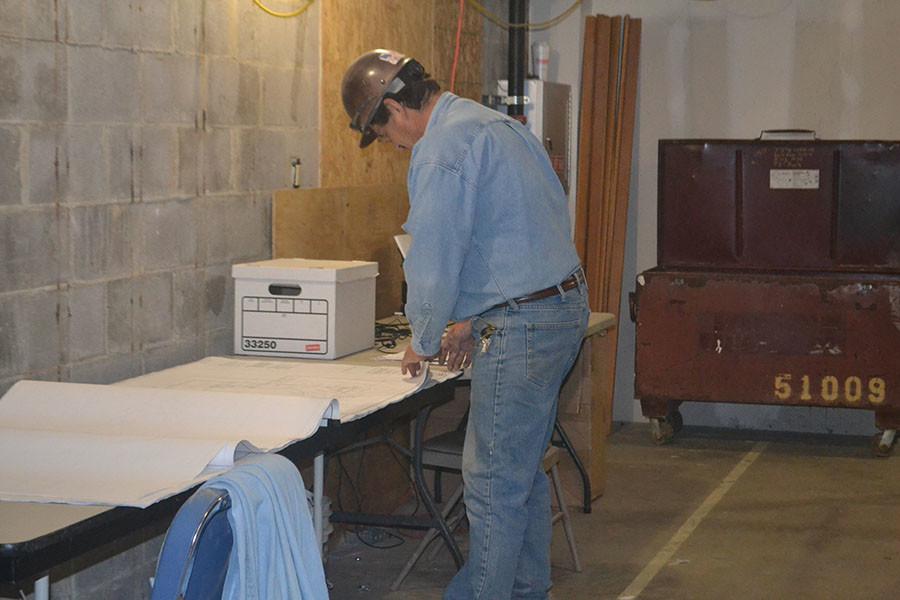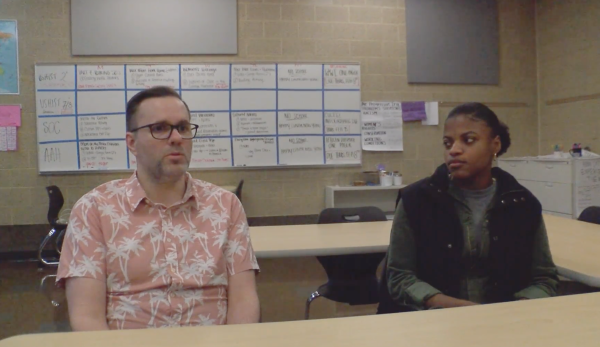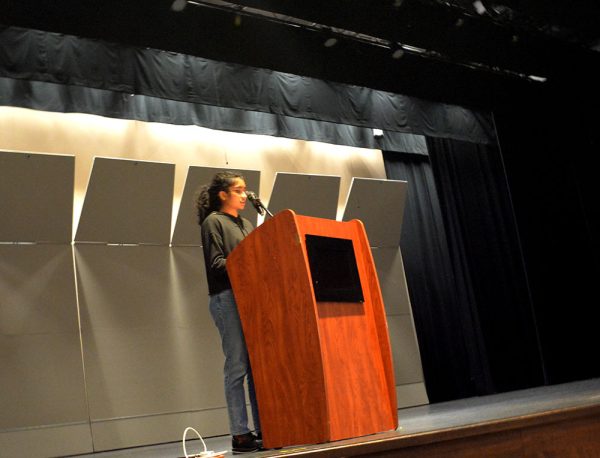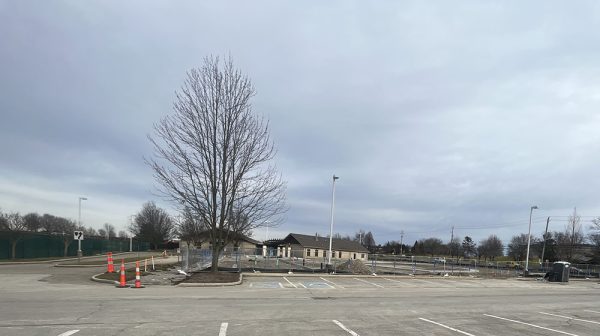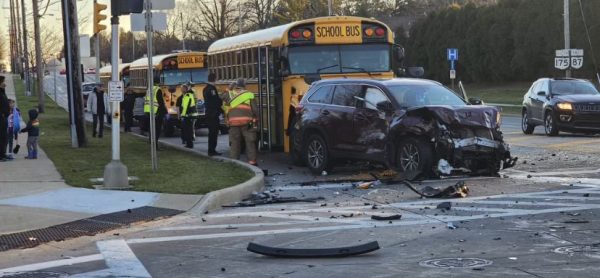Construction Commences on BHS Auditorium
During the Sept. 15 Beachwood Board of Education meeting, $3.5 million worth of construction contracts were awarded, granting official approval for the auditorium renovation to begin.
“Finally, you hear the sound of hammers and nails…finally,” Superintendent Bob Hardis said.
Workers have created a temporary enclosure and blocked off certain parts of the auditorium. The current task is demolition, and the project is scheduled to be complete July 15th, 2016.
The design of the renovated auditorium has not changed despite the hiatus in construction.
“The new design will have a very modern feel that will fit with the overall scope of the high school,” Principal Dr. Ed Klein said.
A major difference from the old auditorium will be a new seating bowl where all seats will have a clear view of the stage, in contrast to the former arrangement.
Finally, you hear the sound of hammers and nails…finally.
— Superintendent Bob Hardis
Two small restrooms will be added to the lobby, as the district is aiming to improve accessibility for handicapped visitors. The old design has restrooms on the upper floor, meaning audience members had to climb stairs or go farther to find restrooms.
Senior Inkyu Kim has been in the auditorium for orchestra concerts since elementary school, and doesn’t have fond memories of the restrooms.
“The [upstairs] restrooms were horrible. They were dark. They smelled. … [They were] very disgusting,” Kim said.
The auditorium construction is split up into six bid packages, assigning specific tasks to different contractors.
“Whoever has the lowest bid for the work gets the job. And that’s how … we guarantee to our taxpayers that there’s no favoritism,” Hardis said.
The project will cost the district $4.5 million.
“The intention is to pay for this out of our general fund,” Hardis said.
The general fund holds a balance: money that is not spent on the expenses of a typical school year, such as staff salaries and books.
Hardis said that the cost of the project will not take anything more from the community, and that the district is in a good position to pay for the project.
“We’re very fortunate,” Hardis said.
The difference between the price of contracts and the estimated total includes paying the architects and equipment the district chose to purchase themselves, including projectors, screens and seating.
The auditorium construction was initially estimated to be completed by the beginning of the 2015-2016 school year. However, the bidding process caused major setbacks in the schedule.
“The biggest struggle was making sure we were effectively allocating the community’s resources,” Klein stated.
It was a setback when we switched construction managers, but it was a necessary setback, because we had the understanding that we needed to do a better job using the taxpayer resources.
— Principal Dr. Ed Klein
Bids for the project were opened three times. They were opened for the first time in April 2015, under the Albert M. Higley Co.
The consulting firm’s job is to assemble the bids from various contractors and turn them over to the district.
However, the district concluded that bids under Higley were not competitive and stopped working with them.
“I wouldn’t say we knew for a fact,” Hardis said. “We suspected it.”
According to Hardis, the district works with an owner’s representative and a school attorney who have experience with multiple construction projects and schools.
Previously, the renovation project was assessed by an engineering/architectural consulting firm, whom Hardis said estimated a much lower cost than what the bids indicated.
There were few bids, which made them less likely to be competitive.
“It was a setback when we switched construction managers, but it was a necessary setback, because we had the understanding that we needed to do a better job using the taxpayer resources,” Klein said.
The district suspects that Higley may have miscommunicated the project’s details to contractors.
“We think some firms were scared away by the fact that this was a renovation project within an active school building,” Hardis said. “They may have believed there would constantly be work stoppages.”
When laborers are forced to work after hours, the wages have to increase, raising the total cost of the project.
“[Contractors] seemed to fear that this project was going to have a lot of trouble,” Hardis said. “We thought this project was getting a bad reputation that it didn’t deserve.”
Hardis said that in the two and a half years BHS underwent renovation, there was only one stoppage, caused by a strong smelling sealant on the roof.
After signing with Scaparotti Construction Group, bids were reopened on July 9. However, the district was unable to accept contracts by law, because the prices exceeded their project estimate by over 10%.
The packages were reconfigured, contractors were given time to review the details of the project and the project’s estimated cost was recalculated.
On Sept. 3rd, bids were opened for the last time, and the district was able to accept contracts.
While the auditorium was always scheduled for renovation, the need to install a fire sprinkler system and remove asbestos expedited the construction. This has affected BHS for the past three years.
“You have to juggle multiple events in limited venues,” Klein said. The auditorium has not been open to the public since spring 2013.
Although many students express frustration whenever the target completion date is pushed back, there is some understanding of why it had to happen.
I feel sad because I won’t be able to see it, but in two, three, four years, whoever is going to be here is going to have an awesome auditorium.
— Senior Inkyu Kim
“I can’t say that I am too mad about [the delay], because there are are a lot of logistics involved,” Kim said. “You really can’t blame them.”
The Class of 2016 will be the last to have used the old auditorium as high school students, but will have graduated upon its re-opening.
“I feel sad because I won’t be able to see it,” Kim said. “But in two, three, four years, whoever is going to be here is going to have an awesome auditorium.”
Hardis has kept the community updated through emails and said he feels they are impatient for the auditorium to be available again.
“All the different organizations that utilize the auditorium or have in the past have been part of the design process and everyone who has seen it is really excited, I am too,” Hardis said. “I think it’s going to be a really beautiful auditorium.”
“They’re excited that the district has done their due diligence to make sure we’re using the community’s resources effectively [and] making sure we’re allowing this to happen in the best possible way,” Klein agreed.
The design has been shown to community groups, such as the Beachwood recreation dept. and local orchestras.
“People are going to be very happy when it’s done,” Hardis said.
The contracts were originally approved at a Sept. 11 meeting, but all resolutions during this meeting were rescinded and reapproved on Sept. 15.
The Board looked ahead and saw that the regular Sept. 14 meeting would conflict with the Rosh Hashanah holiday, and opted to move the board meeting to Friday morning at 8:30 a.m.
However, they did not notify the public about the agenda of this meeting until 6:00 p.m. on Thursday.
According to Ohio Sunshine Law, special meetings require a 24 hour advance of the specific agenda.
Hardis said meetings are frequently rescheduled to address time sensitive issues.
“Sometimes, we will ask the Board to meet specially at a different time … in order to get the business of the Board done,” Hardis said.
The district administration tried to rectify the mistake by following the advice of the Sunshine laws, which suggest to void the resolutions passed at the unannounced meeting and approve them again.
“The laws govern how the Board conducts business,” Hardis said. “We are well aware that there are Sunshine laws.”
Hardis said the specific law had never been brought to the district’s attention, despite regular rescheduling.
“We now know, and we’ll never do it again,” he said.

Senior Clarissa Djohari is currently the News Editor and a Layout Editor for The Beachcomber. She is most interested in reporting the students' perspective...



